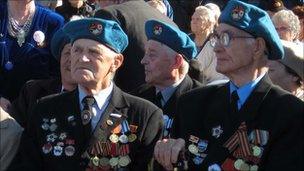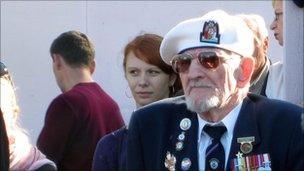WWII Arctic convoy veterans recall 'dangerous journey'
- Published
Royal Navy veteran David Edwards Cottrell: "That was one of the proudest moments of my life, to have done such a thing"
In the centre of Arkhangelsk stands a curious monument: a Mark V British tank dating back to just after the Russian Revolution.
Many here see it as a symbol of foreign aggression and western interventionism. It was captured after British-led forces had landed in northern Russia to try to fight the Bolsheviks.
A little more than 20 years later, British tanks were heading back to Arkhangelsk (the town which was better known in Britain as Archangel). This time though, the Russians were more than delighted to see them.
The tanks, together with fighter planes, fuel, ammunition, raw materials and food, were among a string of emergency supplies to the Soviets from their Western Allies.
The Soviet Union had been invaded by Nazi Germany and the supply missions aimed to help the Red Army fight back.
But to get the goods to northern Russia, convoys of ships had to steer a treacherous course from the UK through the icy waters of the Arctic Ocean. Winston Churchill once described it as "the worst journey in the world".
"The Germans tried all sorts of tricks," recalls 86-year-old David Cottrell from Bristol, a gunner on a Royal Navy destroyer which had been escorting the convoys.

Winston Churchill said the arctic convoy mission was "the most dangerous journey in the world"
"The Germans would send in U-boats. Also, loads of aircraft. So you were being attacked by air and underneath.
"On occasion you did get several German destroyers out from Norway to intercept. On my second convoy, a German torpedo missed our ship by inches. It hit another vessel and sank it."
Bad weather was the other enemy - thick fog, pack ice and raging storms.
Between 1941 and 1945, the Arctic convoys transported more than 4 million tonnes of supplies to the Soviet Union. More than 100 ships were lost with 3,000 sailors losing their lives.
'So many friends'
To mark the 70th anniversary of the arrival of the first convoy in Russia - codenamed Operation Dervish - a group of British veterans travelled to Arkhangelsk.
At a ceremony by the River Dvina, I watched British and Russian war veterans embrace and take photographs of themselves together.
As a sign of their town's gratitude for Allied help in the war, local schoolchildren presented the UK visitors with red carnations.
A Russian boy with a remarkable voice performed a dramatic song about the perilous nature of the wartime convoys.
"When I left Russia at the age of 17 after my last convoy, I never dreamed that at the age of 85 I would still be coming back here," said merchant navy veteran Gordon Long MBE.
"We get such a wonderful welcome. We have so many friends here."
Among them is Russian war veteran Boris Grigorievich.

Veteran David Cottrell said the mission was one of the "proudest moments of my life"
"I remember the convoys coming here. They arrived battered - they were all iced over - but they helped us so much and the main thing was that Russia and the Allies were working together," he said.
But there was a degree of suspicion, too.
A number of Russian women who fell in love with visiting British sailors were later arrested as spies and sent to labour camps, victims of Joseph Stalin's paranoia.
What is more, the headquarters of Capt Mond, chief of the British naval mission in Arkhangelsk, were reportedly bugged.
But UK veteran David Cottrell has no regrets for having been part of the operation.
"When we were on the convoys, we thought this was absolute hell," he admits.
"Looking back, I think this was one of the proudest moments of my life.
"My son tells me I must write all my memories down. 'You're living history,' he says. 'Once you're gone, it's all gone.'"
The British veterans' trip to Russia was funded by the Big Lottery Fund's Heroes Return 2 programme. The programme is open for applications until 31 January 2012. More details on how to apply are available via its advice line: 08454 10 20 30
- Published21 August 2011
- Published19 August 2011
- Published12 January 2011